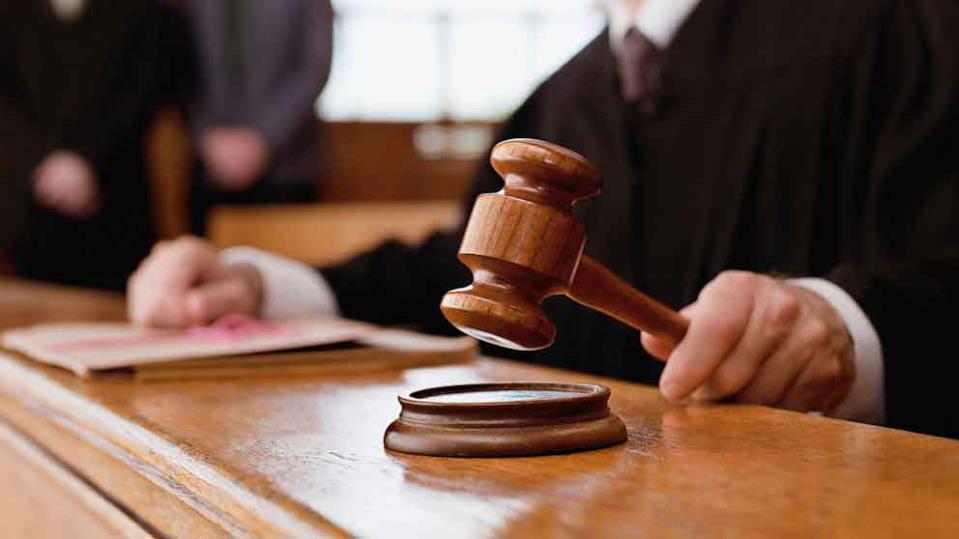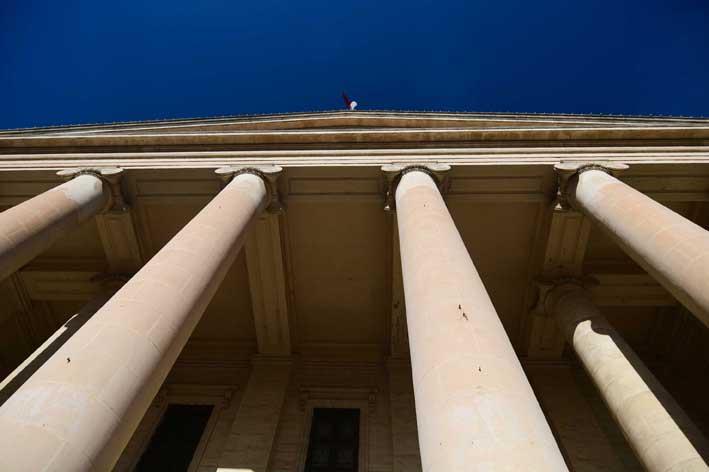The manner in which the judiciary has been appointed over the years has given rise to the friends-of-friends selection criterion, rather than one based on meritocracy, the Dean of the Faculty of Law at the University of Malta, Professor Kevin Aquilina, told The Malta Independent on Sunday.
"We see advocates being appointed judges and magistrates hailing from the political arena without any reasonable cooling-off period having elapsed since they last participated in politics," said Aquilina, when questioned by this newsroom regarding his reaction to comments made last Sunday by former European Court for Human Rights judge, Giovanni Bonello.
Aquilina penned the introduction to Bonello's book Misunderstanding the Constitution: How the Maltese judiciary undermines human rights, describing him as a 'unique man'.
He went on to say that there were also advocates who had not returned to Parliament and who had been given a consolation prize for having served the political party in government through being appointed judges and magistrates. Other advocates were appointed to the judiciary who are somehow related to those in power.
"In colonial times, we had a Prime Minister who appointed himself a judge and also a Minister responsible for justice appointed judge," Aquilina added.
In his view, the selection procedure does not reflect well on the appointees themselves who might, in fact, be people of integrity. But the perception is that they are political appointees who have been appointed not because they deserve to be but because they have managed to jump the queue through party allegiance.

The Judicial appointment matter will require at least two generations to address
"Any measures that are adopted to redress this matter, if any are after all adopted, will require at least two generations to come into effect," Aquilina pointed out. This situation has existed since 1964, he said, pointing out that - in the 55 intervening years - no drastic changes had been made.
Pointing directly to the current administration, Aquilina said: "It failed to implement those parts of the Bonello Commission report of 2013 that advocated these changes. Yes, we do get some tweaking here and there, but the end result remains the same: all the judiciary are political appointees and owe their appointment or promotion not to an independent judicial body, as is the case in democratic Europe, but to none other than the Prime Minister, that same person who is called upon by the citizen to review governmental actions."
When asked if he agreed with Bonello that many of the judiciary only rubber-stamp abuse by the powerful, Aquilina said: "When one reads judgments of the Constitutional Court and the Civil Court, First Hall (Constitutional Competence), one gets the impression that the judiciary is more positively receptive and accommodating to the might of the government than to the citizen's eternal fight for justice.
"Democracy and the rule of law have been problematic in Malta from when we gained independence in 1964 to date", Aquilina explains, adding that no government has, however, had the courage to take the bull by the horns and address these two issues.
"Once in Opposition", he continues, "both political parties pledge to right what is wrong but once in government, and the newly-anointed Prime Minister has taken his first step in the Auberge de Castille, he is affected by the virus of total amnesia, conveniently forgets electoral pledges, remembers that his is not a government of national unity and continues to follow the bad example set by his predecessor in government by ditching public offices on to the blue or red-eyed boys and girls, depending on which political party is in government."
Aquilina points out that in Malta, essentially, public offices are not distributed on the basis of merit but on political party loyalty. He explains that this is because the winner takes it all and, once in office, he has to quench the thirst for blood of his supporters by handing out lucrative public appointments.

'No member of the judiciary can bite the hand that feeds him'
When asked if the statement that members of the judiciary owe their job, promotions and board appointments to the same person they are supposed to control causes a problem, Aquilina said: "It certainly does perception-wise, if not in actual reality.
"No member of the judiciary can bite the hand that feeds him or her for the simple reason that he owes his position to the Prime Minister and it is the latter who decides whether or not he gets promoted."
He goes on to say that, in the past, the position used to be worse because the judiciary used to represent the Government of Malta on the boards of international and regional bodies.
"Essentially, they are at the mercy of the government. The whole appointment and promotion procedure, as long as it continues to be administered by the government, stinks."
Malta is the EU member state that most violates the European Convention on Human Rights
Referring to the comment made by Bonello that 90 per cent of the Constitutional Court's decisions tried by the Strasbourg Court are overturned, Aquilina said: "In order not to continue to make Malta blush in Europe", the government is now adopting out-of-court settlements so that the European Court of Human Rights does not have to enter another perennial judgement against Malta.
"We are at the rock bottom of those Council of Europe member states that violate most of the European Convention on Human Rights and the problem is that this does not appear to bother successive governments", says Aquilina. "The judiciary also has a part to play because it is their judgments that are being overturned in Strasbourg." He goes on to say that the judiciary is not affording an effective remedy so one can ask why waste endless time in Malta to find no remedy when this can be obtained more quickly before the Strasbourg Court.

Government advocating route to go straight to Strasbourg Court
Aquilina says it is "absolutely shocking" that "special exceptions" are made in Strasbourg in cases against Malta, when it comes to some particular human rights cases, whereby they are told to go straight to Strasbourg.
"Not only this, but it appears that even the government is advocating this route," he adds.
'Attorney General has to be in Prime Minister's good books'
"Undoubtedly it is," Aquilina said, when asked if he agrees with the statement made by Bonello that the Attorney General's position is "totally untenable" because of the two hats he wears.
He explains that, in England, from where we inherited our Constitution as in the case of judicial appointments, this has changed for the better. But in Malta, the Director of Public Prosecution is none other than the Prime Minister's legal advisor. "Naturally, even the Attorney General is in a dependent position, like the judiciary, vis-a-vis the Prime Minister. If the Attorney General wants to be rewarded by being appointed a judge, he has to be in the good books of the Prime Minister. Otherwise, all his aspirations to judicial office will vanish into thin air."

Chamber of Advocates declines to comment
When this newsroom asked the Chamber of Advocates for its comments on Bonello's statements, as well as its answers to questions related to those statements, the Chamber replied that it was declining to comment on the matter.
Government has implemented unprecedented changes to strengthen judiciary - PL
In reaction to Bonello's comments, the PL noted that the government has already implemented unprecedented changes in order to strengthen our judiciary. The changes were also noted positively by international institutions such as the Venice Commission, it added.
"There are other planned changes aimed at continuing to modernise our democratic institutions," the PL said, adding that the changes that had been implemented, along with those still to be proposed, had been ignored in a quarter-of-a-century of PN administrations.
PN calls for immediate action and constitutional changes
Asked for its input on the state of affairs, the Opposition Nationalist Party slammed the practice of state capture being employed by the government, calling for immediate changes and for those changes to be enshrined in the Constitution.
The PN noted: "At present the institutions in our country are ruled by the government. As the Venice Commission has indicated, the Prime Minister has great power in his hands and much greater power than the institutions that are supposed to control him, such as the President, the Parliament, the Cabinet, the Courts, the Ombudsman and other important functions of the State."
Noting how, in its conclusions, the Venice Commission had "confirmed that Maltese jurists say the Prime Minister is making appointments of judges and magistrates who are not truly independent."
In fact, the PN noted that, last Sunday, Judge Emeritus Giovanni Bonello had said that 16 of the last 17 appointment in the judiciary were all relatives of party politicians, cronies of ministers or are somehow politically intertwined.
"The Venice Commission also said that the Attorney General wears many hats. The Nationalist Party agrees with the conclusions and recommendations of the Venice Commission in that the appointment of judges and magistrates needs to be made in a truly independent way, and not by the Prime Minister.
"The Party also agrees with the Venice Commission that the Attorney General needs to be freed from his dual role by the creation of a Prosecutor General.
"The Nationalist Party believes that these recommendations should be implemented immediately and should also be enshrined in the Constitution."